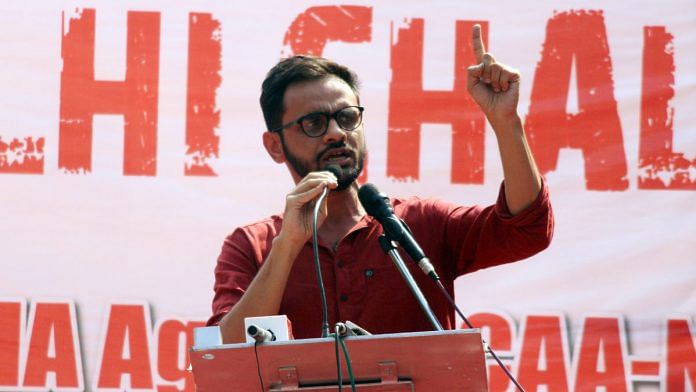New Delhi: Former JNU student Umar Khalid’s arrest under the Unlawful Activities (Prevention) Act Sunday and subsequent remand to 10-day police custody is just the latest in a string of arrests of student-activists in connection with the February riots in Northeast Delhi.
Clashes broke out in late February between groups in support of and opposed to the Citizenship (Amendment) Act, and took on a communal colour. At least 53 people were killed and around 200 were injured. Two policemen were among those killed, while 108 personnel received injuries.
Umar Khalid, co-founder of the activist group United Against Hate is among 18 people arrested so far under FIR 59 of 2020, which alleges a “conspiracy” behind the riots. The FIR also invokes UAPA sections 13, 16, 17 and 18, pertaining to offences of unlawful activity, commission of a terrorist act, collecting funds for a terrorist act and conspiracy for committing a terrorist act respectively.
Also read: Detention of Delhi riots accused extended under UAPA for police to finish probe
Mostly Jamia and JNU students
In April, the Delhi Police booked Jamia Millia Islamia Ph.D. students and Jamia Coordination Committee members Meeran Haider and Safoora Zargar under the anti-terror law. Zargar was granted bail on “humanitarian grounds” on 23 June; she was five months pregnant at the time.
Asif Iqbal Tanha, a third-year student of Persian at Jamia, was arrested in May by the Special Cell of Delhi Police under UAPA for allegedly being a part of a larger conspiracy behind the Delhi riots. Tanha was first arrested on 18 May for his alleged role in the December Jamia violence, and was booked under UAPA on 21 May while being in judicial custody.
Gulfisha Fatima, an MBA student from a private university who had completed her graduation and post-graduation from Delhi University, was also arrested in April. Fatima, 28, was arrested on 9 April and booked under UAPA on 18 April.
Pinjra Tod members and JNU students Natasha Narwal and Devangana Kalita were arrested in May and June respectively under UAPA. While Kalita is an M.Phil student at the Centre of Women’s Studies, Narwal is a Ph.D. student at the Centre for Historical Studies. Both had graduated from Delhi University before joining JNU.
Narwal and Kalita were arrested on 23 May for the anti-CAA protests outside Jafrabad metro station. And even though they were granted bail the very next day, the Special Investigation Team of the Crime Branch sought to re-arrest them in another FIR, on more serious charges of murder, attempt to murder, rioting and criminal conspiracy.
On 30 May, Kalita was again arrested in an FIR relating to the protests in Delhi’s Daryaganj in December 2019. Kalita, who was already in judicial custody, was then slapped with UAPA charges on 5 June for her alleged role in inciting communal riots. This was the fourth case against her. Meanwhile, on 29 May, Narwal was booked under UAPA as well.
JNU student Sharjeel Imam was also arrested under UAPA. Imam is pursuing his Ph.D. in modern Indian history at JNU’s Centre for Historical Studies, and is a computer science graduate from the Indian Institute of Technology, Bombay. He has been booked for allegedly delivering inflammatory speeches against the Citizenship (Amendment) Act and the proposed National Register of Citizens in December 2019, and was arrested by the Delhi Police Special Cell under the UAPA in August for his alleged role in the Northeast Delhi riots.
Why UAPA is considered stringent
The UAPA aims at preventing unlawful activities and also give the central government power to designate an individual or an organisation as a “terrorist”. Under ordinary criminal law, an individual is entitled to bail by default if the investigating agency fails to file a chargesheet within 90 days. But under UAPA, the period of probe and detention of the accused can be extended up to 180 days.
Section 43D(5) of UAPA also makes bail virtually impossible. It says that nobody accused of the terror offences under the Act will be released on bail if the court, after perusing the case diary and police report, “is of the opinion that there are reasonable grounds for believing that the accusation against such person is prima facie true”.
Also read: NIA cites use of ‘comrade’ and ‘Lal Salam’ on Facebook to substantiate UAPA, sedition charges




My vote for lifetime goes to one and only BJP.
Hang these terrorists.
Thank god the masterminds were caught otherwise we would have continued to wonder who did what
Hang these terrorists.